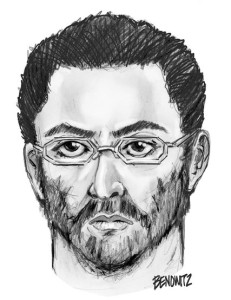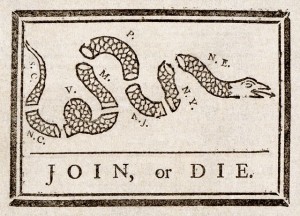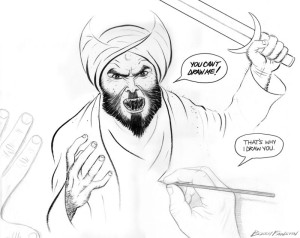Last week I had the pleasure of witnessing a panel discussion at the Rush Arts Gallery moderated by Julie Ashcraft, who is currently curating an exhibition entitled The Grand Cypher: Hip Hop, Iran & Syria. You can see the multi-media exhibit through May 24th, but I decided to take in the works of art and poetry last week in order to listen to a riveting conversation about the nature of hip hop within a global context, the opening of which you can view for yourself. In addition to acclaimed independent rapper Immortal Technique and New York attorney Jenny Poupa Marashi, who was born in Iran, there were two artists who participated in the panel via Livestream, Ehsan Ziya (Atour)-who hosted the first hip hop podcast in the nation of Iran-and Francis A. Willey, a composer and artist known not only for an iconic image appropriated by freedom activists in the Middle East but for an innovative, less toxic method of processing photographs.
What struck me about this event was the way it embodied was the transcendent nature of art. Many of the artists whose works were displayed in this exhibition had experienced indescribable hardships-including war and imprisonment-in order to have their voices heard. The fact that they are able to recognize the importance of art-and how essential it is to life-in the face of threats to their own livelihood and security demonstrates its universality to the human condition. In a society where artists clamor for subsidies from unwilling taxpayers, it was refreshing to experience artwork which was created at great personal sacrifice, often in defiance of government censorship.
One of the most fascinating aspects of the panel discussion was a debate over the role of the hip hop community in fostering public debate over critical domestic and foreign policy issues. Immortal Technique-the Peruvian-born, Harlem raised rap artist Felipe Andres Coronel-was arguably the ideal person to address this subject, being at the forefront of independent, conscious hip hop. Even though I was familiar with some of his views prior to this discussion, I was nonetheless wowed by the breadth of knowledge on display by Coronel, whose commentary ranged over the role the Sykes-Picot Agreement played in the current, sanguinary problems in the Levant, to the extent of white slavery within an empire of oppression dominated by Arab-Muslim armies of conquest in the past. Regardless of what you think of his personal political philosophy, it’s difficult to argue that Immortal Technique brings a sagacity and historical knowledge to his work that is sadly lacking in the contemporary rap world.
Ehsan Ziya, his Iranian counterpart, contributed his own fascinating observations to this discussion, which also delved into the necessity of maintaining creative and financial control over the work you produce. As an artist in an Islamic theocracy which exercises complete control over what artistic expression and information is allowed to be consumed by the general public, he experiences life very differently than artists living in North America or Europe. The plight of those seeking to create independent cinema, music and art within Iran is well known in the west, however very few people are aware of the struggles of the underground rap scene. One of the chief obstacles rappers like Ziya must overcome is the Catch-22 facing musicians who seek to turn their passion into a vocation. Namely, that in order to monetize their art these rap artists need to be widely known among the Iranian public, but once they become well known, the authorities rapidly crush them.
Even though he is not explicitly political, Ziya faces persecution because of the incipient threat that any large group of individuals-even those who merely share a common interest in a particular musical genre-pose in the wake of the Green Revolution. Unsurprisingly, artists who do not challenge the existing political status quo-even in an oblique manner-receive the full support of the regime-a point validated by the approval of a rap LP devoted to the devastating 2003 earthquake in Bam, which was produced by a group of musicians who had the full-throated endorsement of the IRI and its state institutions. The chasm that exists between those artists who are unencumbered by the desire to please authority-and as a result, are persecuted by the powers that be-and those who insist upon kowtowing to power, was thrown into stark relief by The Grand Cypher.
Therefore, I highly recommend visiting this exhibition, which will be on display through next week.








Recent Comments